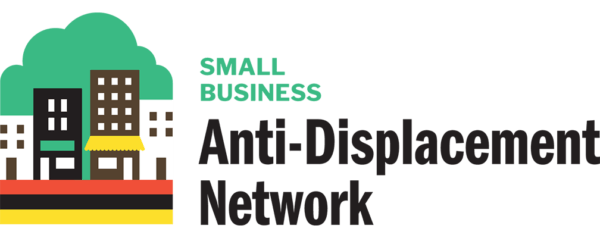
November 1-3
Our conference sessions will highlight a range of tools and strategies to combat small business displacement and strengthen the social and economic fabric of neighborhoods. Small business leaders, scholars, policymakers, and community advocates will talk about the latest commercial gentrification research and how they are supporting BIPOC- and immigrant-owned small businesses through on-the-ground efforts. SBAN case study grantees will discuss anti-displacement efforts in in London, Kolkata, Montreal, and six metropolitan areas in the United States: San Francisco, Chicago, Washington, D.C., Miami, Los Angeles, and Seattle.
Conference Tracks
Track 1: Access to Capital & Technical Assistance
Access to capital is about more than access to dollars, it’s also about access to social capital, including networks and knowledge about critical resources. This conference track will explore multidimensional pathways to small business growth and holistic solutions for small businesses facing displacement and gentrification pressures. Through engaging discussions, insightful panels, and collaborative workshops, we will explore how equitable access to diverse forms of capital and robust technical assistance can collectively fortify the foundation of our communities, fostering sustainable growth and resilience for the most vulnerable businesses.
Track: 2 Community Ownership & Wealth Building
In a series of workshop and panel sessions, community development financial institutions (CDFIs), developers, foundations, government agencies, and community advocates will discuss the challenges, successes, and everyday realities of different commercial property and community ownership models. This conference track will address the nuts and bolts of transitioning entrepreneurs to brick-and-mortar property owners, including new investment models, collective ownership, and building political will and coalitions to push policy. Drawing on examples of commercial corridors throughout the U.S., including those ravaged by COVID-19, participants will showcase the important work being done to help BIPOC and immigrant entrepreneurs and communities build wealth, stability, and sustainability.
Track 3: BIPOC Business Data Analysis & Tools
Data on the race and/or ethnicity of small business owners is crucial for identifying businesses vulnerable to displacement, yet the data on BIPOC- and immigrant-owned businesses are scarce, difficult to access, and challenging to employ. The lack of accessible data makes developing policies and practices that keep small businesses in place more difficult. This conference track offers insights into efforts around the nation to collect and maintain small business data, identify and organize data from existing sources, and use data to design business preservation programs and measure program success.
Track 4: Anti-Displacement Organizing
Community organizing is key to advancing impactful anti-displacement policy and practice. This conference track will focus on coalition building, advocacy tools, public policy, and legal considerations related to how BIPOC and immigrant communities can enact alternative models of organizing and innovative anti-displacement policies. National policy experts will discuss how local chains and monopolies directly impact small businesses. Representatives from AAPI and other BIPOC communities will also share steps that they have taken to enact meaningful policy campaigns and actions.
Track 5: Post-Pandemic Resources & Lessons Learned
Learn more about the impact of the COVID-19 pandemic on BIPOC- and immigrant-owned small businesses and how organizations and communities have come together to support these entrepreneurs. This conference track will explore how to build business resiliency in the face of economic crises, the resources available, and how diverse types of businesses and communities have navigated the pandemic recovery. Presenters will discuss lessons learned, including the most effective strategies for helping businesses adapt, preserving cultural heritage, and fostering economic equity going forward.
Track 6: The Future of Small Business Policy & Advocacy
Delve into the future of small business policy and advocacy and gain invaluable insights from case studies of best practices and anti-displacement strategies from across the country and around the world. Panel discussions in this conference track will explore how federal, state, and local governments are fostering economic opportunities for legacy and emerging businesses, especially those owned by people of color, immigrants, and women, while promoting community wellbeing and equity. Participants will have the opportunity to strategize together about advocacy opportunities at all levels at this particularly critical time for BIPOC- and immigrant-owned small businesses.
